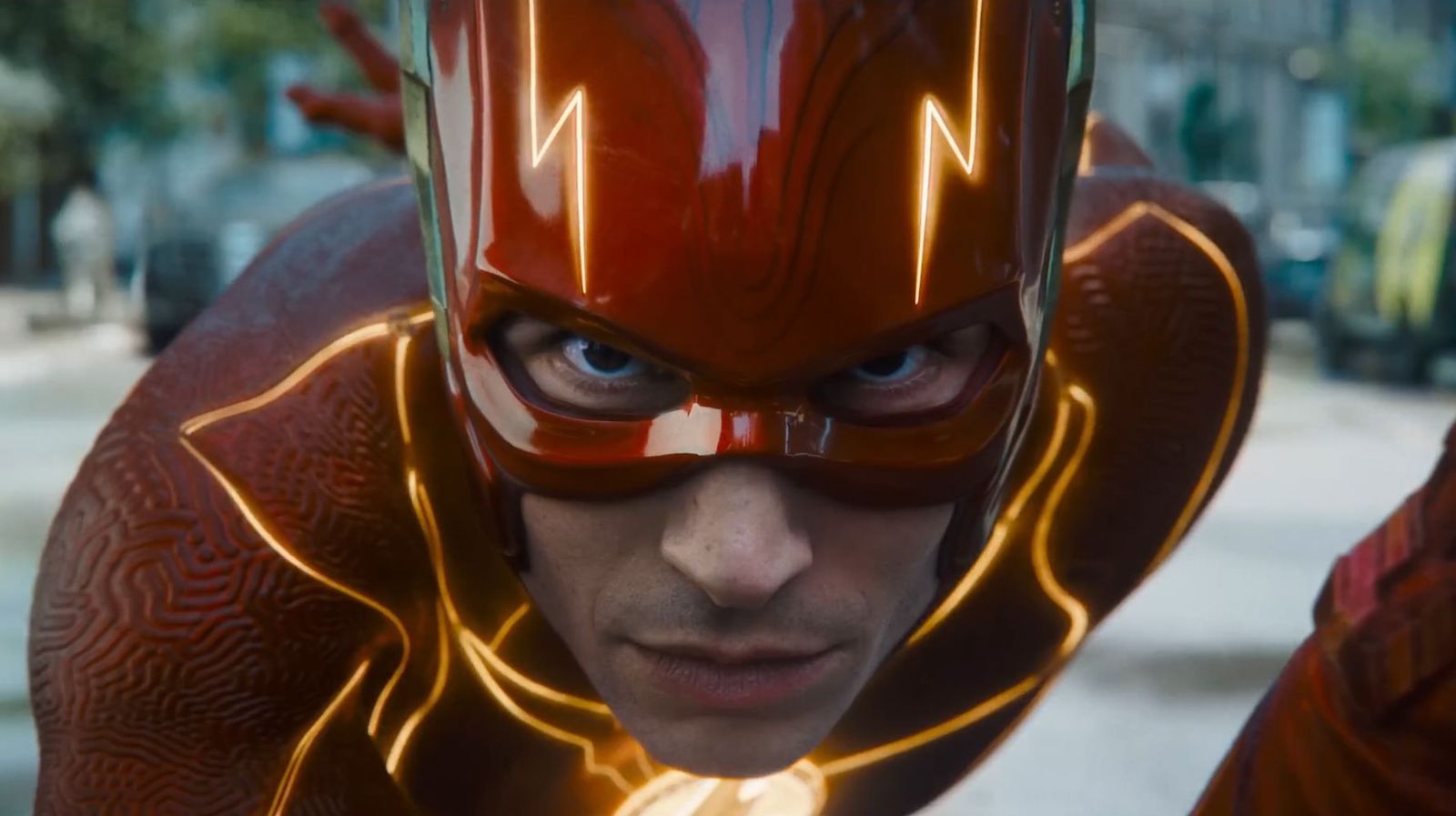The Flash is, in a word, a nightmare. In 20 words: a haphazard, loud, obnoxious experience that will make for either an excellent or horrifying stoned viewing when it hits streaming. I won’t recount the plot of the film; it’s too stupid and you can read much more thoughtful, generous critiques elsewhere. The only element that’s worth noting here is how and why director Andres Muschietti implements the digital resurrection of Christopher Reeve as Superman in a mind-numbing sequence that has absolutely no bearing on the narrative whatsoever, not that such a reason would give the use of his likeness any more legitimacy.
In the last decade, as DC and Warner Bros. have maneuvered their actors, projects, and characters around in an attempt to create an interlinked cinematic universe to compete with Marvel, many, many plans have fallen apart. Zack Snyder’s daughter died by suicide during the production of Justice League, resulting in Snyder stepping back and Joss Whedon filling in, with disappointing results. Ben Affleck hated playing Batman. Gal Gadot, besides being a Zionist, poisoned everyone’s minds by singing “Imagine” during the pandemic. Black Adam flopped. An entire nearly completed Batgirl movie was canceled. Ezra Miller couldn’t stop doing weird, culty, criminal shit just as the studio was trying to make them the new face of the DC universe. In the midst of all this, studio heads, executives, directors, and writers took over a litany of future projects before leaving due to “creative differences,” if they weren’t outright fired. One unnamed DC project, which some believed to be The Flash, was rumored to have as many as 45 writers involved.
So, in a sense, it’s a small miracle that The Flash, which was originally announced in 2014 with a release date in the spring of 2018, was made at all. Should this movie have even been made? It’s not a relevant question. Billions of dollars have been spent and earned on the premise that superhero franchises are the most reliable way for a studio to continue to generate more opportunities to make money, and so these movies arrive like the weather. This isn’t always a bad thing. At various points along the timeline good ideas coalesced into interesting movies that honored and referenced their comic book source material while attempting something new.
At one point in The Flash, the titular hero eats a microwaved burrito in mid-air before stuffing a falling baby into that same microwave. Which is another way of saying that the aforementioned era of curiosity and integrity has long since passed.
By the time the digitized corpse of Reeve shows up, the audience is primed for that sort of thing to happen. Muschietti has created an intensely unreal world in his film, one in which every single frame has been digitally altered in ways both subtle and glaring. Poorly rendered CGI body and face doubles, attempts at natural-seeming environments, and boilerplate supernatural special effects overwhelm every scene, forgoing any attempt at photorealism or artful augmentation in favor of outright saturation. These effects were clearly created by rushed, overworked, and underpaid legions of VFX artists. In that sense, the film’s aesthetic is even more unsettling given the conditions in which it was made. Not that it seems to matter to Muschietti, who cares less about creating memorable compositions than “interesting” ones that tickle the most reptilian parts of the brain. This means shots and sequences that foreground fan service and “cool” moments in exchange for images that look patently unfinished with no recognizable style whatsoever. And, because Muschietti’s idea of going about this involves the cinematic equivalent of jabbing at what he wants his audience to find interesting, it comes as no surprise that Michael Keaton shows up midway through the film to reprise the Batman role he originated with Tim Burton. Following his lengthy appearance is the crudely animated composite of Reeve as Superman and Helen Slater as Supergirl, a rubbery, de-aged Nicolas Cage as an alternate Superman (some sort of bewildering homage to Tim Burton’s unrealized Superman Lives project), and a similarly gruesome black-and-white George Reeves as his Superman from the 1950s television series. Adam West even gets tossed in there.
Christopher Reeve’s use here is particularly ghoulish. During the sequence in which he appears, various realities, represented as color-coded globes, are shown colliding into one another. The point comes across pretty clearly because it’s represented so literally, but Muschietti can’t help himself. So he zooms in to show the audience brief glimpses of the interiors of each of these worlds. In Reeve’s world, a screensaver sun rises above water towers and a vague city skyline before Superman descends into frame, his face flattened onto a three-dimensional head, the proportions of his CGI body slightly off, the same as Slater’s, whose Supergirl floats down next to him, her face appearing as if it were copied and pasted onto a mannequin. The camera swings around the Supercousins as they look with dead eyes and frozen expressions onto the split reality that’s causing their world to collapse, before pulling back and zooming into another uncanny, lifeless CGI plane. What’s the point of all this? One potential answer is that DC and Warner are testing the waters, setting up a contrived multiverse for future films to play around in, which raises the grim possibility that in the future their dead IP will be puppeted around in scenes that contain actual dialogue.
As for many, Reeve’s Superman was my Superman. He made an often overpowered, overbearingly earnest and maudlin character into something approaching a real, breathing, plausible person. If an actor’s work is capable of any true meaning, it can be found in the impressions that work leaves behind. Here I am now as an adult, still turning over ideas raised by Reeve’s performance, and though it’s silly to think there would be no DC universe without Reeve or Superman director Richard Donner, even as Reeve’s interpretation fell into the legacy stream, its resonant effects remained. For example, it’s impossible to watch Henry Cavill take a turn at playing this generation’s Superman and not see clear homages to what Reeve established before him.
It’s this idea of legacy, and the worthwhile creative efforts that can go into shepherding an iconic character or franchise from one generation into the next, that Muschietti so eagerly tramples. Feelings of nostalgia are to be expected from any superhero movie, but for those feelings to mean anything requires well-placed homage and genuine artistic flourishes. But dangling a silent, uncannily digitized avatar of Reeve in front of the audience can only bring out feelings of revulsion. It’s like going to a family reunion and, instead of basking in the warmth of your relatives telling stories about a beloved dead grandfather, being forced to watch them dig him up and drag his bones around all weekend.
As I watched The Flash, I was reminded of Ari Folman’s 2013 science fiction film The Congress, lightly based on the novella The Futurological Congress by Polish science fiction titan Stanisław Lem. The book, like much of Lem’s work, describes a confused, confusing world dying at the hands of human wastefulness and ecological destruction. Through a series of convoluted plot points, the novel’s narrator, via the accidental imbibing of hallucinogens, takes a journey through time and reality, toggling between utopia and dystopia, between a claustrophobic slow-motion apocalypse and an existence shaped entirely by the mind as a refuge from that apocalypse. “A journey is a dismal thing when there can be no homecoming,” the narrator observes. This idea of returning to a place, or even one’s self, as an irrevocably changed person is picked up in Folman’s part live-action, part animated adaptation.
Swapping out the novella’s U.N.-like setting for the depravities of the entertainment industry, The Congress follows Robin Wright, an actress played by Robin Wright, who is facing increasing irrelevance as she ages. With the help of her agent, Wright signs a lucrative contract with a studio, which buys her likeness in perpetuity. Per the contract, Wright can no longer act. Instead, her digitally-scanned avatar will do the acting for her, appearing in a series of computer-generated films and other properties created by the studio. Further into the future, this technology is combined with powerful hallucinogens like those described in Lem’s original work, except these drugs allow users to inhabit the imaginary bodies of others, including Wright’s virtual self should she agree to sign a new contract, in effect surrendering not just her already-commodified likeness, but her entire being. It’s a depressing future to consider, and one that feels less far-fetched with every CGI resurrection.
Ethically, whatever Muschietti and Warner Bros. have done here is repulsive, though not new. Along with the more mundane aspects of corporate greed comes a new way of double-dipping, not just into tried-and-true cash cows, but into familiar representations of people long dead. And though, for now, most of these instances revolve around unspeaking avatars (Muschietti doesn’t even try to make Reeve’s mouth twitch), that won’t always be the case. Just-good-enough digital approximations of people are a stopgap for the inevitable push toward lifelike stand-ins indistinguishable from real people, the realm of the uncanny gradually exited to the sound of audience applause. Little about Hollywood has changed in the course of its history, which is why even the worst assumptions often prove to be true, and why Reeve, in a 1982 interview with Playgirl, had the good sense to acknowledge the following:
Playgirl: Will that be the end of Superman?
Reeve: Yes for me.
Playgirl: Absolutely?
Reeve: Yeah, I don't know....Unless they come up with a really great idea. But if someone said, "For 10 million dollars, you'll love it," I'd say no. I've never done a project for money; that is for money alone. I have no objections to making money, but I don't do work because I have a house with a pool and I have to pay for it. If there's nothing you really want to do, move out of the house. No one says you have to have a swimming pool. I think when you start working for money you turn a corner. It's a violation, really-
Playgirl: Of what?
Reeve: Of your integrity. You've got very few things that are private in this life. You've got your pride and yourself, and those are the last things you can sell. You can sell sex, you can sell your secrets –how you run around the house, make love swinging from the chandeliers. People do that regularly. One of the few things you have to hang onto is your integrity about your work, and I think work defines a great deal of who you are. If you don't have any pride in your work, then I wonder, who are you?






